Google AI Overviews, Perplexity AI, Microsoft Copilot, and an ever-growing sea of AI-generated SPAM content: The digital landscape is changing — and marketers should be concerned.
This blog post isn’t meant to scare you. But marketers should brace for a turbulent next couple of years. There are still gains to be made in SEO — and companies shouldn’t move away from it (yet) — but SEO could soon look a lot different.
Sure, Google’s AI Overviews (aka SGE) are a laughing stock now (due to poor sourcing and inaccurate answers) while other AI tools like ChatGPT are facing accusations of GDPR violations and copyright infringements — these platforms still pose a big risk to your SEO and overall digital marketing strategy.
AI results and dedicated AI-search engines are likely to eat into your organic search traffic. Companies should consider now the impacts these platforms will have and how their marketing strategies should evolve to combat a possible decline.
AI-generated content will only further muddy the waters — inevitably leading to an endless amount of generic content. If we’re all saying the same thing due to AI-generated, “spun” content, and as Google makes it harder to drive traffic to your website, how can SaaS businesses continue to stand out?
I have a few thoughts on the matter and where digital marketers should focus over the next few years …
1. An Unbeatable Brand Will Never Die
Brand is one thing you control. No matter what happens in the evolution of AI, or what Google Algorithm update is released, you still own your brand.
A strong brand trickles down to everything you do: Building trust, storytelling, standing out amongst your competitors, and showcasing your product in the best possible way. When four out of five customers need to trust a brand before buying, the importance of building a strong brand can not be understated.
To achieve an unbeatable brand, companies will need to have a continued focus on:
- Design (i.e., web design, graphic design, etc.)
- Maintaining a consistent brand image across all channels (e.g., website, social, email, etc.)
- Creating an identity that stands apart from competitors (e.g., is your brand easily identifiable amongst your competitors? Is your messaging unique? Does your branding invoke the feeling you want to be known for? Think playful vs. sophisticated)
But trust is more than just consistency. Customers today are craving the human element, which AI fails to satisfy. Convincing customers to trust your brand will become even harder with more AI-generated content, plagiarism, ethical controversy — and an increasing number of suspicious customers.
For instance, how can customers trust that what you say and write was created by experienced professionals in your industry or just something ChatGPT came up with?
2. The Rise Of Communities As A Haven For Authenticity
Over the past year, Reddit has experienced insane growth in organic search traffic:
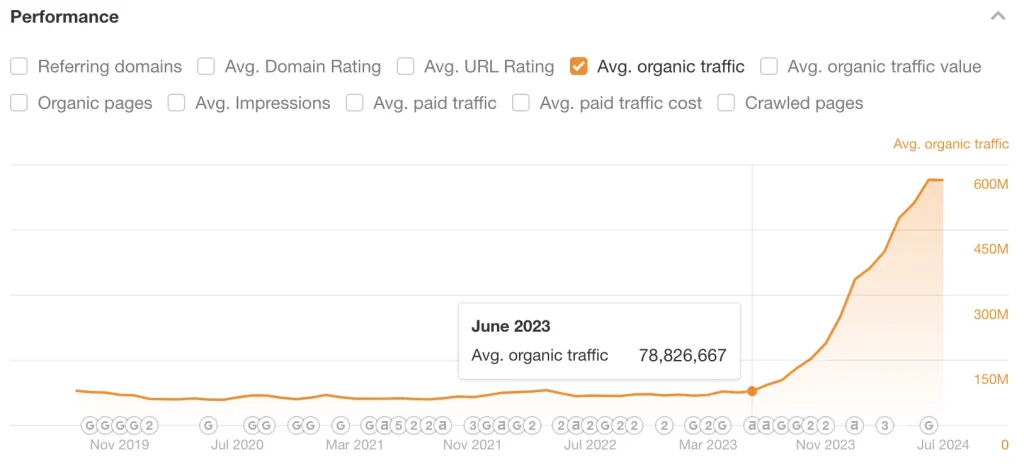
According to data from Ahrefs, Reddit’s organic search traffic has grown over 600% (Ahrefs estimated organic search traffic to be around 78M per month in June 2023 and 600M per month in June 2024).
More and more, we’re seeing Reddit show up at the top of almost every Google search, with multiple links per result …
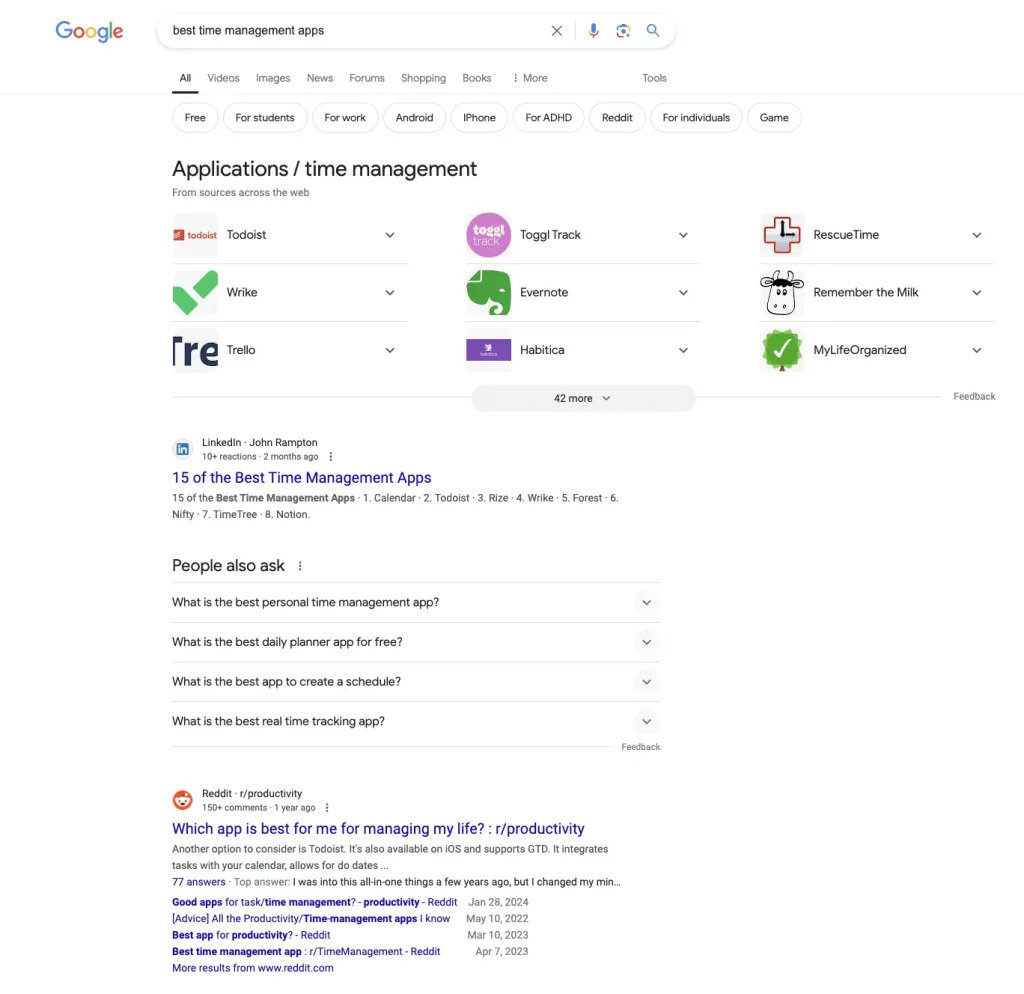
No other sites get this type of “preferential” treatment. (It’s not like Google stands to financially gain from Reddit growing and getting more traffic. **Cough cough**, insert Google’s $60M partnership deal with Reddit)
Whatever the reason is, Google has made a big shift over the past year to more prominently display communities in search, with Reddit as the leader and others like Quora following behind.
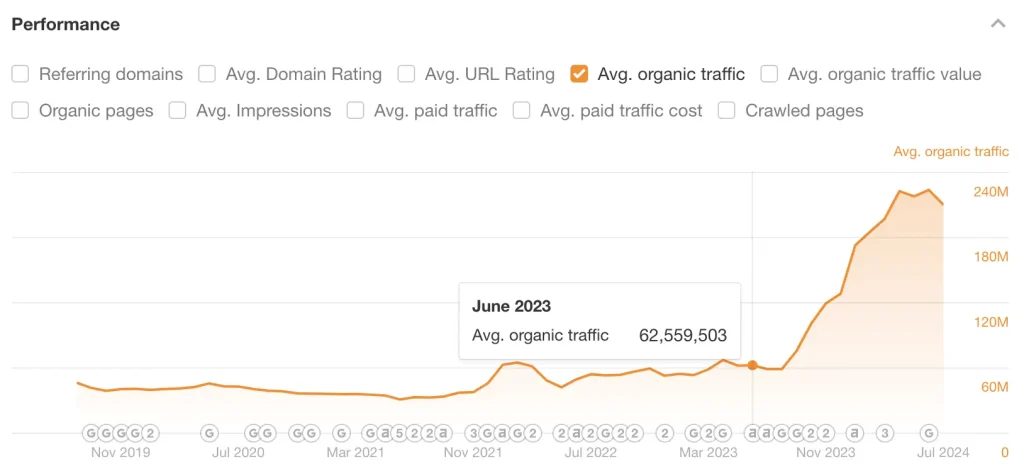
Quora Estimated Organic Search Traffic
Some have argued that this has degraded Google’s SERPs, which is a fair point.
Why should you trust the advise of some random Redditor who might not even be qualified to give it? (vs. an article written on the topic by an expert in the field)
Still, this shift is a sign that people are craving human recommendations, which may be accelerated as AI-generated content becomes more prevalent. I imagine people are becoming skeptical of results in Google, which will only become more of a problem as AI improves and more people use it for content creation.
How will readers be able to trust that what they’re reading was written by an actual human who is knowledgeable on that topic?
This is where communities come into play — allowing people to find insights and recommendations from “real” people (though, who’s to say that some of the comments in a Reddit thread aren’t AI-generated responses too? But, I digress).
A few that will continue to rise in popularity, include:
- Quora
- Slack groups
- WhatsApp groups
- Niche communities (like Discord or fandoms)
Since Reddit now accounts for nearly half of all top ten search results, there’s an interesting marketing opportunity. How can you take advantage of communities to drive traffic and exposure to your business? And should you?
Digital marketers need to consider the best ways to tap into these communities if they want to be authentic to smart (and suspicious) audiences …
3. Controversial Digital Marketing Strategies May Not Be Worth It
Parasite SEO is a digital marketing strategy where marketers attempt to redirect visitors from high-traffic websites. It’s earned some controversy since the practice relies on the reputation and traffic of other websites instead of building your own — and the practices can often be quite spammy.
Google consistently updates its algorithm to penalize sites it suspects of using Parasite SEO. On May 6th, 2024, they stated their crackdown could include outright removing these types of sites from search results. Though, it’s not clear if penalties will target posting on sites like Reddit.
One practice I’ve seen is people posting in top-ranking Reddit threads to drive traffic and/or exposure to their business (I haven’t tried myself, though, I will admit I’m curious to see what types of results others have achieved with this tactic). Maybe they can’t create content themselves to rank for a particular keyword, but they can post in a Reddit thread that shows in the second or third result for that search.
Of course, Reddit has moderators to combat these types of activities. But moderators are volunteers and may struggle to keep up with removing these types of posts at scale.
Additionally, this practice often targets older threads (that are still ranking highly in search), which likely means they aren’t as closely monitored. Theoretically, someone could post there, unnoticed by moderators, and then get other people (employees, friends, family, etc.) to upvote their comment so they show up at the top of the thread.
Outside of Parasite SEO, we may also see an uptick in companies using User Generated Content (UGC) to counteract AI-generated content. This approach does double duty for marketers, saving them time crafting new content while prioritizing real, human-made feedback. However, it’s here that digital marketing faces another challenge: how to use communities ethically.
Several potential legal and privacy issues emerge from relying on customers to create content. Some customers may not be comfortable having their information reposted without consent, while others may have already copyrighted that content.
Digital marketers also need to be careful not to become too comfortable with having customers take the helm of their marketing strategy. Overreliance on UGC runs the risk of losing sight of your brand identity and long-term goals.
4. Trusted Influencers And Writers Will Continue To Rise In Popularity
If AI-generated content becomes more prevalent (particularly in search) — and people become wary of whether that content was written by a real person or not — they may look to everyday people or well-known identities they can trust.
Think influencers and well-known writers/content creators that people enjoy and trust. Sites like Substack and Medium may see an uptick, where people can easily follow their favorite writers — and always be up-to-date on expert-driven content vs. searching in Google for what could be AI answers or AI-generated content.
This might already be the trend. Here’s a look at Substack and Medium organic traffic growth:
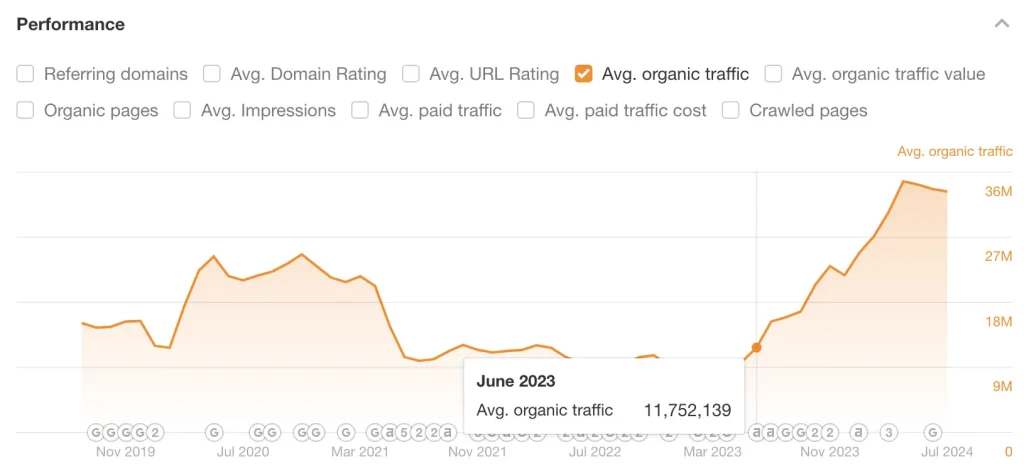
Medium Estimated Organic Search Traffic
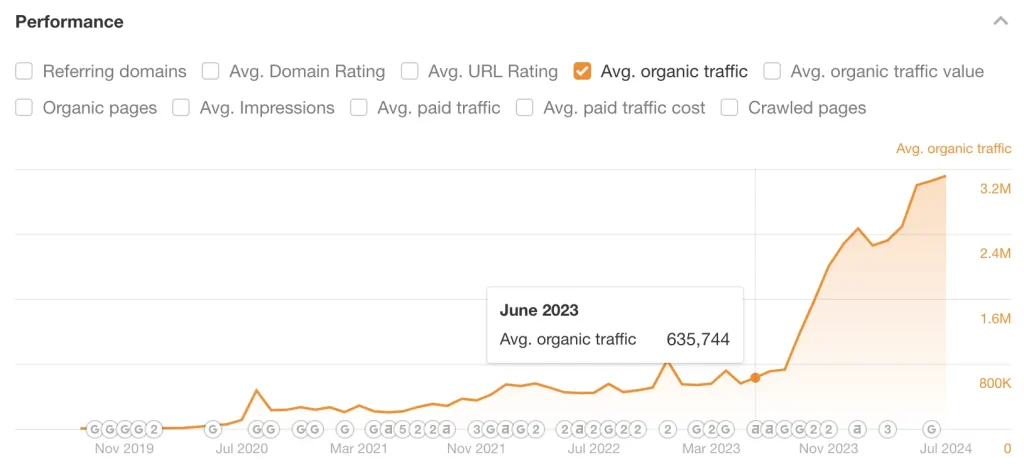
Substack Estimated Organic Search Traffic
Both are popular platforms for individual, expert writers seeking to grow their readership. Of course, there could be other factors at play but I imagine Google is prioritizing these websites because writers here provide unique insights and expertise that searchers are craving.
5. Getting More Value Out Of The Traffic You Already Have
Generating traffic from Google is getting harder, and that will continue to be the trend over the next few years. One reason is the growing number of zero-click searches — Google searches where the answer is provided directly in the SERP without needing to click through on any of the results.
A 2020 study found nearly 65% of all Google searches are zero-click.
Zero-click searches will become more prevalent with the launch of Google’s AI Overviews (i.e., expect these overviews to “steal” traffic from your website).
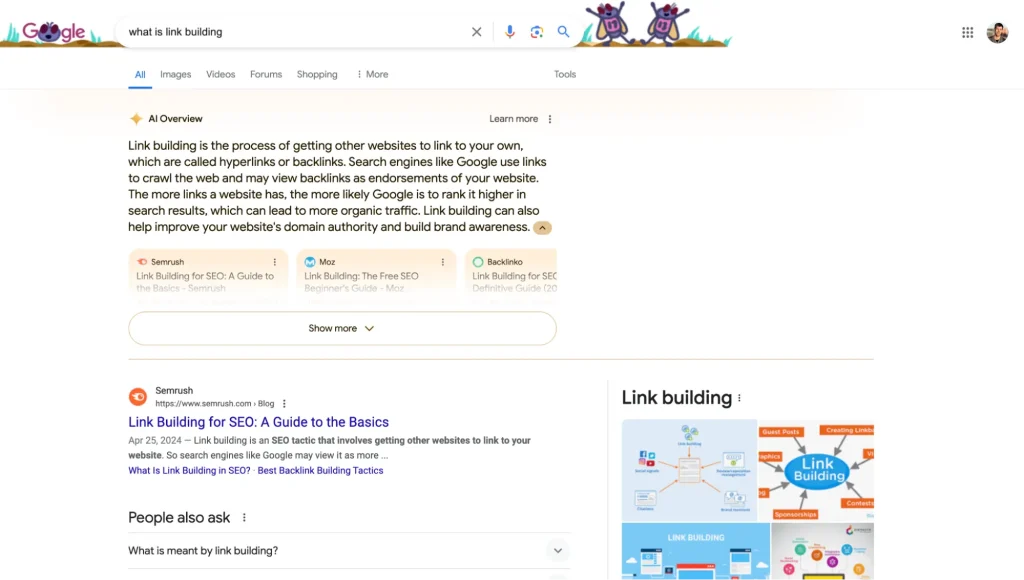
Google usership may even decline as AI-powered search engines, like Perplexity AI, become better or more popular — which may be accelerated as Google’s SERPs continue to worsen (because of factors like an increase in low-quality results, big brands dominating search, or communities not sufficiently addressing user search queries).
As traffic becomes harder to get from Google, a focus on extracting the most value out of the traffic you already have will become more important.
Here are a few places you can look:
Email database nurturing
One place you can look to get more value is your email database. You can try creating more effective emails, conducting A/B tests to improve conversions, or crafting nurture/drip campaigns.
If traffic declines, improvement in conversion rates through your email list can help maintain or grow your demo requests/signups.
Conversion rate optimization (CRO)
Another place you can look is optimizing your website. Conversion Rate Optimization (CRO) — or the strategy of increasing conversions on an already existing website — will become vital.
A CRO strategy could involve creating two versions of landing page copy, then running an A/B test to see which performs better. It could also mean creating a new page layout with a different color scheme to see how it affects page activity.
Even a small improvement could mean a big increase in inbound, especially if you continually test on key pages (such as your homepage or your demo request, pricing, and/or signup pages).
Website personalization
Another is utilizing personalization at scale (e.g., personalized web pages). Companies like Mutiny and Folloze are making this possible (combined with data platforms like 6Sense) to show extremely personalized pages to visitors based on attributes like industry, company size, segment (e.g., enterprise, mid-market, small business), and more.
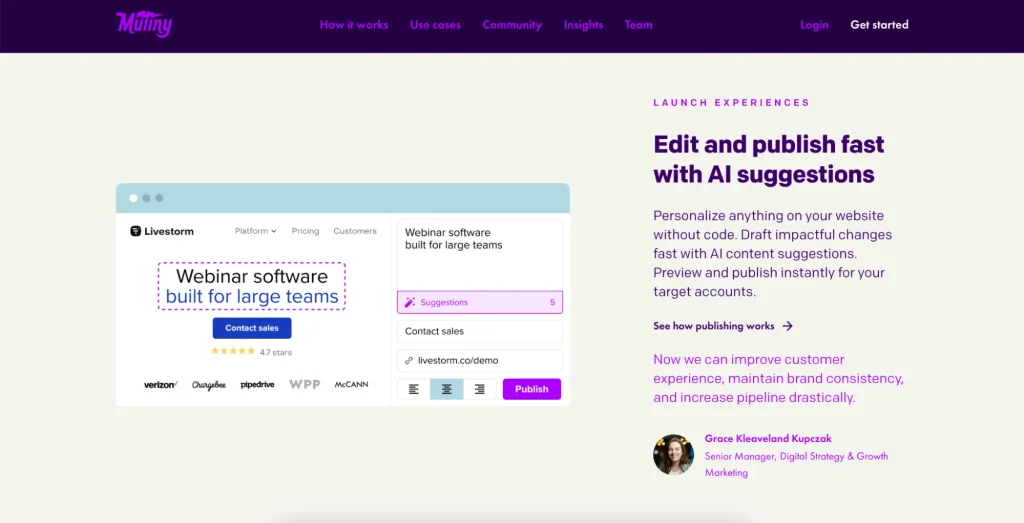
Personalization isn’t a new concept. But companies need to go beyond old tactics like simply adding a person’s name to an email or website.
In the case of an email marketing tool, the company might change its headline from something like “The Best Email Marketing Platform for SaaS Companies” to “The Best Email Marketing Platform for E-commerce Companies” based on the different verticals they want to optimize their website for.
Here are a few other ways you might incorporate personalization:
- Personalizing headers across your website for different verticals
- Showing different customer logos, testimonials, case studies, etc. specific to that vertical (e.g., if a visitor in the Fintech industry is viewing your website, you may customize your homepage to show customer logos in the Fintech space or Fintech-specific customer case studies)
- This same action could be applied across the most vital pages on your website (homepage, pricing page, demo request page, signup page, etc.)
6. Programmatic SEO Will Become More Prevalent
If AI can create detailed articles in minutes, why should you spend time writing content that AI can easily create?
Of course, expert-driven, human content will always have its place. But the ease in which AI can create high-level content makes targeting generic “What Is” searches (e.g., what is link building? What is White Hat SEO? etc.) less appealing. Especially considering these types of searches are more likely to be the ones answered by AI Overviews.
Expect theses types of generic or “top-level” searches to take a big hit. An even bigger emphasis on long-tail keywords will be needed. One of the best ways to target these might be through Programmatic SEO — a process of creating keyword-targeted pages in an automated way in order to target hundreds or thousands of long-tail keywords.
One example is Zapier created hundreds of pages that target searches like “Zapier + SOFTWARE Integrations”. For instance, “Zapier HubSpot Integrations” with a list of Zapier integrations that connect specifically with HubSpot.
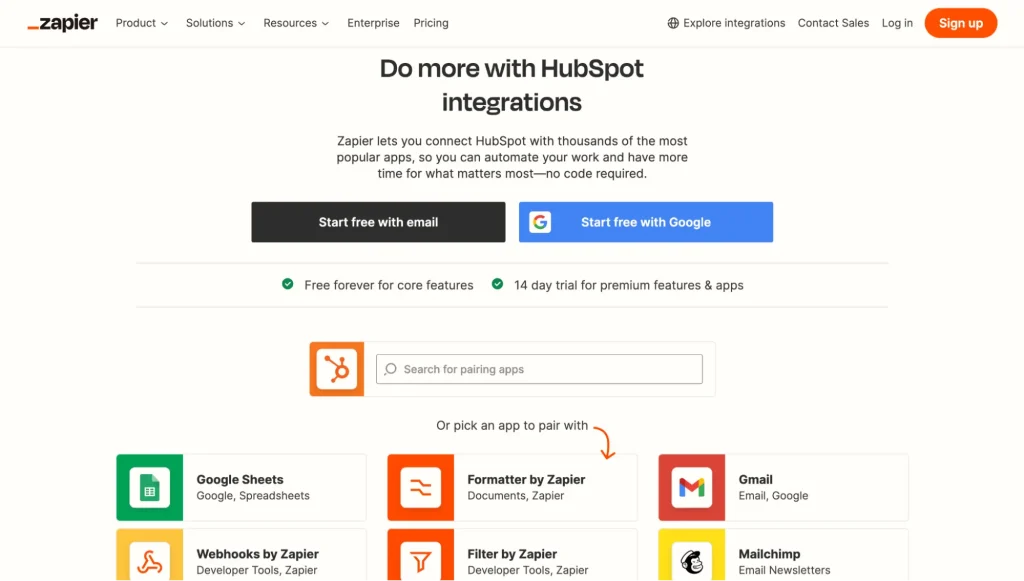
Another example is an “SEO-based tool”. The concept is similar but the landing page then features a tool that visitors can interact with. There are several different ways to approach building a tool and combining it with Programmatic SEO:
- An industry-specific calculator (e.g., ROI Calculator)
- A detailed pricing comparison tool (e.g., GCE Machine Type Comparison)
- Interactive exploration tools (e.g., AllTrails, Wandrly, Tripadvisor, etc.)
- Directories (e.g., RocketReach Phone Numbers)
These are all “tools” which could be used to target long-tail keywords in Google but also provide more value than a simple blog post or guide. Yet, these tools will be difficult for competitors or even AI to replicate — and are not something that can just be shown directly in search.
7. Storytelling Will Never Lose Its Power
AI can create amazing content but it’s derivative of something that already exists. It’s not capable of original thought (yet, at least). It simply regurgitates what others have already created, said, or written.
Marketing teams will continue to use AI tools that accelerate their content creation — inevitably leading to a sea of generic, regurgitated crap. We’d like to think that Google will be able to keep up and hopefully filter out the incredible amount of SPAM that’s on the horizon. But there’s no guarantee. And it’s not just Google. We’ll see more of this content on social media too.
In the wake of all this newly generated content, how can you stand out?
Storytelling.
The human perspective will triumph. Focus on telling your unique story. Your content should be driven by experienced people on your team who can offer a unique perspective — not bots. AI is a tool that can help cut down your workload but it shouldn’t be your default.
So, how can you tell a unique story?
- Focus on customer pain points — and how you are set up to uniquely solve these challenges for your customers. Brands have the potential to tap into the subtle emotions that drive people to buy from them — something that AI can’t do (e.g., connecting with a CEO who needs a few extra hours in their week to spend time with family). AI doesn’t feel the emotions or live the experiences that make stories so beautifully cathartic.
- Tell your customer’s unique stories. How did you help them? What notable results did you achieve? What challenges were they struggling with that you were able to uniquely solve? How did you do it? (Provide detailed, step-by-step insights)
In my opinion, the best medium for storytelling is video. Video offers a unique way to tell compelling stories that written text can’t. Video can connect with people’s emotions on a deeper level. And while AI can generate beautiful imagery, I believe it will struggle to tell compelling stories through video — offering brands a chance to stand out.
Additionally, if Google SERPs degrade in quality, and AI-search engines rise in popularity, YouTube (and other video-lead networks like TikTok) will be a place where companies can find attention.
Obviously, YouTube is already immensely popular (YouTube alone processes over three billion searches per month). Yet, most SaaS brands struggle to create engaging content on YouTube. Usually, this is because of a combination of lack of attention, no defined video strategy, infrequent publishing consistency, and/or limited resources or budget (video is harder to create than written content). Or, it’s because they simply post videos that no one wants to watch (like an hour-long interview vs. short, educational, easy-to-consume content).
Yet, as traffic becomes more difficult to get from Google, YouTube SEO could become more of the priority for brands as way to get attention where attention is being stolen from AI-search engines (there are no AI Overviews in YouTube).
The same could be said of TikTok or Instagram, as the next generations prioritize them over Google (Nearly 40% of Gen Z prefers to search through TikTok or Instagram instead of a traditional search engine).
Still, YouTube stands as the second most popular option behind Google for people who need answers, tutorials, or entertainment. A SaaS business could target YouTube search terms — and get traffic through a long-term video creation strategy that seeks to grow its subscriber base.
Plan For The Worst, Hope For The Best
Of course, all of this depends on how AI evolves — and whether or not AI-search results are actually what people want to see. Personally, I avoid them due to poor quality results and a preference for detailed articles. But, AI results are sure to improve. Just look at how far ChatGPT has come already …
Still, all of these changes point to one big truth: digital marketing can’t go along with business as usual.
I’m a big proponent of SEO (I mean, I’m a SaaS SEO consultant and I run SEO at a Series-B tech company). SEO will still be a core way to drive website traffic. But, teams should consider the impacts AI will have and should opt for a multi-channel approach that helps them get the most value out of the traffic they already have — and doesn’t rely so heavily on one strategy.
In other words, plan for the worst and hope for the best. Continue to invest in SEO but ensure you’re targeting keywords that won’t be easily answered by AI. Invest in optimizing your website, getting the most value out of your database, and personalizing your customer journey. And consider how you can take advantage of opportunities in community marketing, Programmatic SEO, influencer partnerships, and how you can continue to tell compelling stories.
Stay dynamic and always be ready to evolve to meet people’s needs. One thing’s for sure: centering the human element will never fall out of favor.


.svg)


.svg)